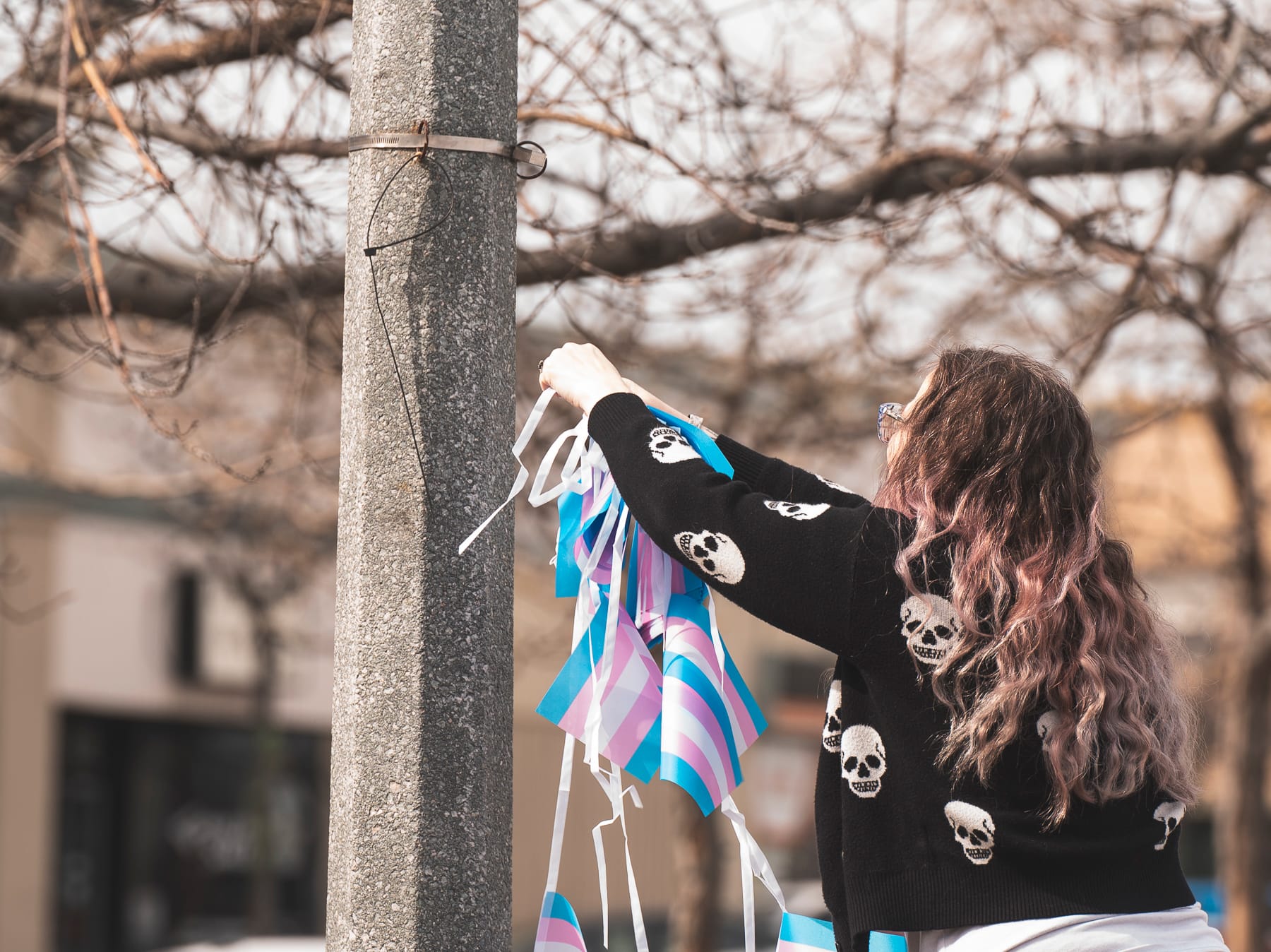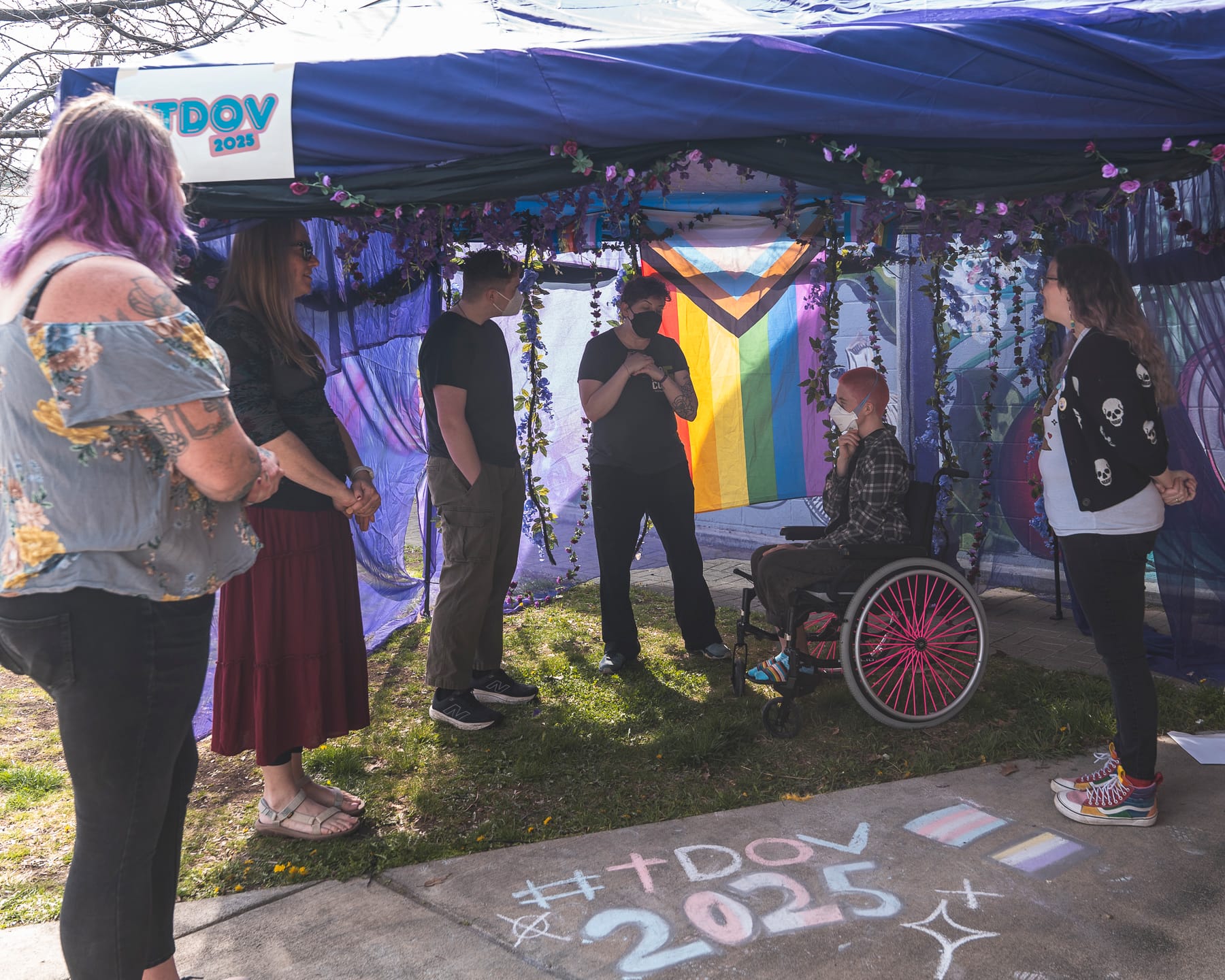Photos by Jan Mennenga (used with permission)
I pass as a straight, cis woman. I know I do. And while I’m visibly queer to a lot people — right now, for example, I’m wearing a rainbow shirt, Pride edition WOXERs, socks with foxes on them, and bright purple hair — I still have the privileges that come along with being married to a white, cis man (and being white, myself). Even the disabilities I live with are mostly invisible.
Trans Day of Visibility
At the end of March, I was fortunate enough to be part of Trans Day of Visibility in Downtown Kennewick. It was wonderful seeing so many community members get together to celebrate and support our trans neighbors and loved ones. I got to talk to so many wonderful people. Some community members gave self-defense demonstrations, offered consultations, and more. We had more clothing donations than we could handle! And we had so many tables filled with community organizations who wanted to show their solidarity.
I even got to perform a wedding! (Yes, I am ordained.) I have done three other weddings since 2017, but this was my first speed wedding. It was quick, but really great! I loved seeing how much the couple adored each other. Their love was so clear.
But what affected me most was something incredibly simple: as I walked from my car to the corner where the event was taking place, someone walking the opposite way, another attendee, looked up and immediately clocked me. We gave each other a smile and a nod. I felt like I belonged.
I FELT SEEN.
As someone who often feels invisible — invisible disabilities, invisible queerness, invisible neurodivergence — it was so powerful to feel seen.
I’m not saying there isn’t privilege that comes with invisibility… I’m no stranger to ‘passing’ guilt. But there is something so fundamentally human about being seen by people who share marginalized identities with you.

Straight passing
Some organizations claim that straight passing is a myth (such as in Rosie Nelson’s 2024 article in the Journal of Bisexuality titled “Deconstructing the Clinging Myth of ‘Straight-Passing Privilege’ for Bi+ People.”)
Others see it as erasure.
In an article by Brittney White on bi.org, she says:
I don't think that being viewed as ‘straight’ by people, queer and straight, is a privilege. It's invisibility. It's a life of being forced to live in the closet. That, in my opinion, is the opposite of privilege.
Marissa Moore, a counselor who specializes in the LGBTQIA+ community, has similar sentiments:
Being perceived as straight isn't a minor inconvenience; it's a significant emotional burden. The misalignment between one's identity and how others perceive them can lead to self-doubt, confusion, and feeling invalidated, which can hinder their ability to fully express themselves.
And that’s real — that sense of not being queer enough; the feeling that you don’t belong in queer spaces if you can ‘pass’ as straight.
But that doesn’t make passing a myth. When people assume I’m straight, it protects me from discrimination.
Both things can be true simultaneously.
Survivor’s guilt
Tessa Caramia, a queer sexologist and community educator, likens the feeling of passing to survivor’s guilt, even while acknowledging that “at the same time, it almost contributes to a sense of self-erasure.”
Jules Rylan also discusses the nuances of the double-edged sword of passing, and explains why she no longer uses the term ‘straight passing privilege’:
My issue with the term ‘straight passing privilege’ isn’t so much that there aren’t inherent benefits to appearing straight to the outside world, because of course there are…. Existing in a way that’s read as straight by other straight people can provide you safety; but also might feel like erasure or repression if you’re in the closet.
So, where does that leave those of us who ‘pass’?
Even the very fact that I have the option to worry about straight passing goes to show the amount of privilege I hold. There are people who are visibly queer, or visibly part of another oppressed group; my feelings of guilt over possibly passing as straight likely seem insignificant in the face of living a life where almost no one makes that assumption.
But I have to turn again to the assertion that even straight-passing queer folks are queer enough, and that gatekeeping helps no one. There is no ‘right’ way to be queer.

Invisibility
In her article “I'm a straight-passing woman. I'm tired of having to come out all the time,” Lola Méndez talks about the burden of being invisible. She sees both sides of the coin: the invisibility and the privilege of passing.
“Straight-passing women being wrongfully perceived as straight can be as simple as a gynecologist presuming you have a boyfriend rather than a sexual partner — or a hotel assuming a double occupancy room is for you and a man,” Méndez says. “Coming out is an ongoing process.”
Méndez also says that it can also be exhausting to have to question whether to disclose your identity in your everyday interactions. She calls straight-presenting a “double-edged sword”.
“It protects me from discrimination but also makes my queer identity invisible,” Méndez says. “While there's an undue burden to being straight-passing, it's also a huge privilege.”

Becoming more visible
Lola Méndez and other straight-passing queer people have found ways to appear more queer, while staying genuine to their sense of style and unique personalities. Some visible changes can be as subtle as adding rainbow nail art or clothing to your wardrobe, or something as simple as wearing support pins on clothing or bags.
Rachel Mendelson, a bisexual woman who is in a relationship with a straight man, talks about using language as a tool of visibility. She uses the term ‘partner’ instead of ‘boyfriend’ to help sidestep the assumption that she is straight, for example. Mendelson says, “A language change is simple, but its impacts are broad….it helps me feel connected to the queer community and secure in my sexuality.”
For my part, I use the term ‘spouse’ almost exclusively, and try to remember to include my pronouns near my name whenever possible. I think that we all have a responsibility to be more visibly queer, especially right now, as a way to support our communities (unless being visible will put you in danger; I am not advocating for anyone to be unsafe). If you have any ‘passing’ privileges like I do, I encourage you to be more visibly queer yourself — or be an outspoken ally, if you’re not in the QUILTBAG club.
I think that some of the guilt I’m holding onto for ‘passing’ is due to the fact that I don’t think I’m using my privilege to its fullest extent. I know I could be doing more. It’s why I’m writing this article, actually. I want this to be another 10% opacity on the layer of my queer identity. And there’s always a chance that reading this will help someone else that longs to be more visible.
I see you.
Sara Quinn is the Editor-in-Chief at Tumbleweird and serves on the board of Tri-City Area Gaming. She lives with her amazing spouse (Brendan), and her doggos (Jewel and Ruby). Sara makes art, writes stuff, reads A TON, plays a lot of games (board, video, and TTRPG), and makes crossword puzzles.
Sara is a queer, disabled, autistic demigirl. She has a dual degree in psychology and sociology, which she mainly uses to fuel her special interest in human interaction (and to pick her Survivor league lineup). She longs for the day when she will finally learn to relax. ¡Ojalá!
References:
- Nelson, Rosie, “Deconstructing the Clinging Myth of ‘Straight-Passing Privilege’ for Bi+ People”:https://www.tandfonline.com/doi/full/10.1080/15299716.2024.2332873
- Brittney White, “The Myth of Straight Passing Privilege”: https://bi.org/en/articles/the-myth-of-straight-passing-privilege
- Maggie Zhou, “The Bittersweet Privilege Of Straight-Passing In Queer Communities”: https://www.refinery29.com/en-gb/straight-passing
- Lola Méndez, “I'm a straight-passing woman. I'm tired of having to come out all the time”: https://www.msn.com/en-gb/news/other/i-m-a-straight-passing-woman-i-m-tired-of-having-to-come-out-all-the-time/
- Jules Rylan, “Why I Don’t Use the Term ‘Straight Passing Privilege’”: https://radiantbutch.medium.com/why-i-dont-use-the-term-straight-passing-privilege-f7f0b06a2c49
- Rachel Mendelson, “What I've learned as a bisexual woman in a straight relationship”:https://www.businessinsider.com/i-am-a-bisexual-woman-in-straight-relationship-lessons-learned-2021-8
- QUILTBAG: https://translanguageprimer.com/quiltbag/


